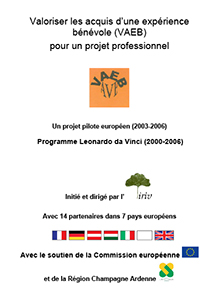Assessing a voluntary experience in a professional perspective
Bénédicte Halba (ed) et Agnès Bathiany, Georgina Brewis, Renato Frisanco, Chantal Ganne, Bénédicte Halba, France Huntzinger, Wolfgang Kellner, Darek Pietrowski, Laurent Pujol, Jürgen Schumacher, Sybille Stallmann-Beseler, Charlotte Strümpel, Andras Toth
- Publication : 2007
- iriv
- 96 pages
- ISBN : 2-9513188-3-9
Associations may be the ideal place to get accustomed and trained to novel and innovative solutions and practices, to experiment or acquire new skills. For volunteers, a voluntary experience may lead or facilitate a professional career. Identifying and evaluating the skills and qualifications acquired through volunteering in the associations should be the way to recognize and validate this informal learning. It should be very useful for people who have no professional experience to face with a first activity (youngsters) and for people who have been kept away from the labour market to renew with a professional activity (parents who have raised their children, sick people when they have recovered, prisoners when they are free...). A voluntary experience is an alternative way to experiment, develop or renew with specific skills and qualifications in a specific context, nor public nor private, with both professional and non-professional staff, with the goal to include and serve the general interest.
The project Assessing Voluntary Experiences (AVE) in a professional perspective was meant to identify, evaluate and validate skills and qualifications acquired through volunteering as an informal learning for a professional purpose for people who without any professional experience (youngsters) and people who have been kept away from the labour market (parents who have raised their children, sick people when they have recovered, prisoners when they are free...).
The results of the work were published in 2007: the portfolio together with the guide.
On the initiative of iriv, experts of volunteering and lifelong learning, from seven countries, have developed a portfolio for volunteers together with a guide for coach. This project implemented between October 2003 and March 2006, in the framework of the Leonardo da Vinci programme (European Commission) was awarded in Helsinki in December 2006, under the Finnish presidency, for excellent practice in addressing the priorities of the Copenhagen process and promoting an enhanced European cooperation in vocational education and training.






























































